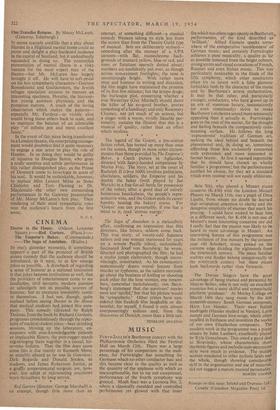FURTWANGLER'S Beethoven concert with the Philharmonia Orchestra filled the Festival
Hall on March 12th. There was a large percentage of his compatriots in the audi- ence, for Furtwltngler has something for Germans which no other conductor has; and this became clear in the quality as well as the quantity of the applause with which an unexceptionable, but to me not exceptional, performance of the fourth symphony was greeted. Much finer was a Leonora No. 2, where a classically moulded and controlled performance yet glowed with that inner
fire which too often rages openly in Beethoven performances, of the kind &scribed as ' brilliant.' Alfred Einstein speaks some- where of the comparative `scentlessness' of German music; and certainly Furtwiingler achieves a pure musicality, a quality as far as possible removed from the bright colours, strong scents and visual evocations of French, Russian and even.ltalian music. This was particularly noticeable in the finale of the fifth symphony, which other conductors often try to invest with a false glamour forbidden both by the character of the music and by Beethoven's severe orchestration. It may be that other, and particularly younger, conductors, who have grown up in an era of sonorous luxury, unconsciously (or even consciously) strive to make Beethoven's orchestra sound more sensuously appealing than it actually is. Furtwangler goes to the root of the matter, for the thought and feeling beneath the comparatively unin- teresting surface. He follows the long 'expressionist' tradition of German art, seeking the ideal behind and beneath the phenomenal and, in doing so, .sometimes offending those less exclusively concerned with expression and more interested in formal beauty. At first it seemed regrettable that he should have chosen so wholly familiar a programme', but the performances justified his choice, for they set a standard which even routine will not easily obliterate.
* Bela Siki, who played a Mozart piano concerto (K.456) with the London Mozart Players on March 11th, was a pupil of Dinu Lipatti, from whom no doubt he learned that scrupulous attention to clarity and the deceptive simplicity of manner that mark his playing. I could have wished to hear him in a different work, for K.456 is not one of Mozart's most interesting concertos nor did 1 really feel that the pianist was likely to be heard to most advantage in Mozart. An interesting feature of this programme was the inclusion of five minuets by the sixteen- year old Schubert, music poised on the extreme edge dividing the eighteenth from the nineteenth century. The more familiar waltzes and landler belong unequivocally to the nineteenth century but these pieces look backwards rather than forwards. * * *


































 Previous page
Previous page